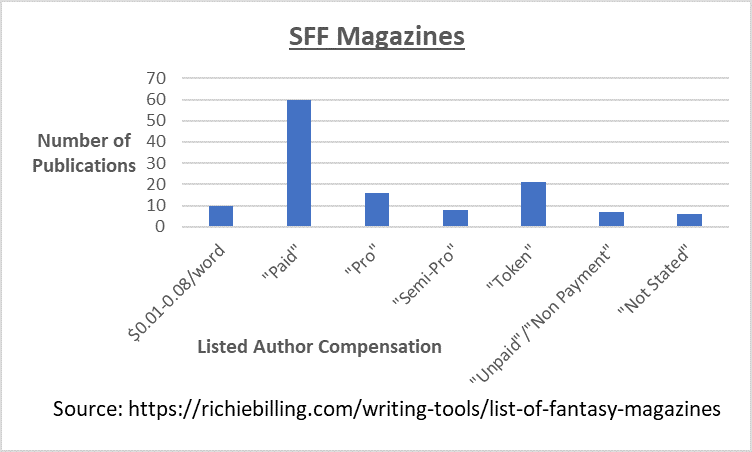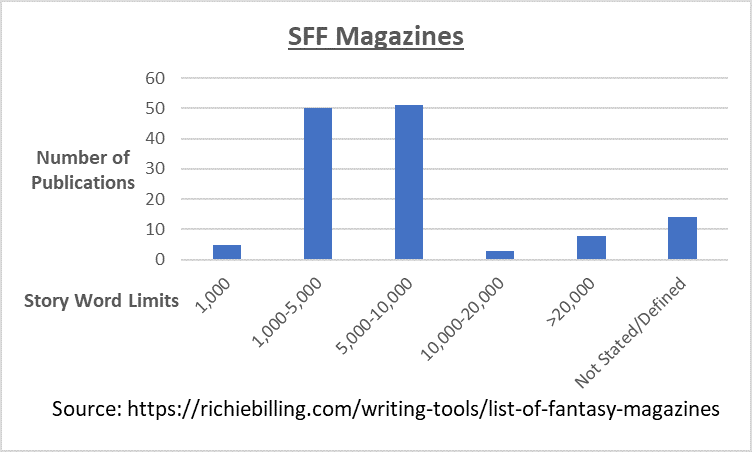I will be attending the Labyrinth of ConFusion science fiction convention this coming weekend (1/19-21/24), near Detroit, and have been asked to sit on several panels. One of those panels is titled: The Current State of Short Fiction. Now there are two ways to view this subject, literary and financial. The discussion could go either way. And is likely to go both at once.
A literary discussion is necessarily subjective, and always flirts with devolving into a shouting match. Not that there’s anything wrong with a rousing shouting match. Gets the blood pumping. Still, it’s helpful to have a set of figures to argue over, point to if they support your views, or scoff at if they don’t. I think that’s how debate works.
Along those lines, I decided to do some slipshod online research regarding the state of the short science fiction and fantasy market at present. I am indebted to Richie Billing, who gathered the data on this market on his website. There are other, possibly more extensive, databases available on this subject, but I was only looking for an overview not an exhaustive study. Being a numbers guy, I simply copied and pasted Richie’s information into Excel and made a couple of graphs.
The first graph shows the spectrum of how much an author might expect to get paid for a short story, if anything. There are 10 publications which quantify how much they’ll pay per word for a story (between $0.01-0.08). About 60 others coyly hint that they’ll pay you something (“Paid”), without specifying exactly what that amount might be. Then there’s 16 “Pro”, 8 “Semi-Pro”, and 21 “Token” publications. I strongly suspect there’s a large amount of overlap on a Venn diagram of those 3 terms. Another 7 come right out and admit they can’t afford to pay you one thin dime. The last on the list are 6 places that just won’t say one way or the other.

It looks like there are 136 separate publications listed in this dataset. Frankly, I was surprised to see this many paying, and “paying”, publications still operational. It would be nice if there were more, but I expected just a few forlorn outposts of speculative fiction, hanging on by their fingernails with grim determination. Instead, the market seems to be healthy (by one definition), perhaps even vibrant. As long as you’re not counting on writing to cover the mortgage payment. And, I understand that publications have been going under for the entire history of science fiction and fantasy magazines; print, fanzines, and online. It’s something of a grand tradition. There’s an entire Wikipedia page about them, if you’re curious. Others arise to take their place, because the demand has always been there, and people willing to roll the dice on a new magazine. And God love ’em for that dedication. Even if we are often too cheap to pay much for it.
The truth is that publication in general, and speculative fiction in particular, is a shaky investment. The business seems to be continually in crisis, and most likely is. It’s like show business, but without the glamor. That said, scribblers can’t help but scribble. Not many of us will ever get rich from it. Like that matters.
So, that’s the data. It provides ample justification for declaring the glass half full, or half empty. ¾ full or ¼ empty, for that matter. Let the shouting begin.
Because I love making graphs, below is a chart showing upper word limit versus the number of publications. There seems to be a couple of sweet spots between 1,000 and 10,000 words. That makes sense for print magazines, but probably shouldn’t matter for an online publication. Electrons being much cheaper to print on than dead trees. Especially if you’re paying by the piece and not by the word. But I guess traditions die hard.

Caveats and Weasel Words: Thanks again to Richie Billing for gathering this information and posting it on his website (https://richiebilling.com/writing-tools/list-of-fantasy-magazines). I do not know how old this information is, but expect it to be relatively current. The figures given are approximate. I might have miscounted the number of publications in this bin or that, but not by much. Also, I ignored the flash fiction publications listed at the bottom, mainly out of laziness.
